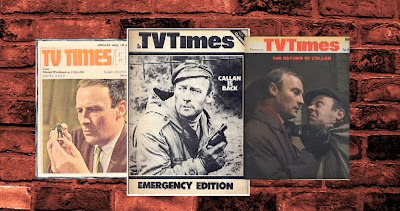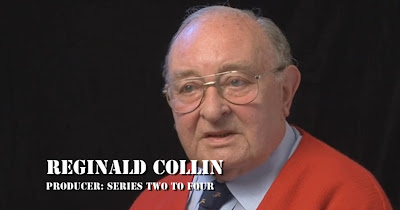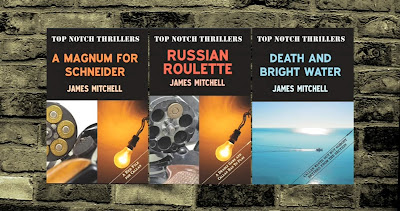 |
| Callan dots the covers of issues of TV Times. |
Release Date: Feb. 1, 2016. Written by: Thomas Cock and Steve Rogers. Directed by: Thomas Cock. Executive Producer: Tim Beddows.
THE PLOT:
The (as of 2016) surviving writers, producers, actors, and directors recall the production of the television series Callan, from its inception as an Armchair Theatre play to its development as a series - and to its ascent as a surprise television hit!
THOUGHTS:
Callan: This Man Alone is, when you think about it, a very unlikely documentary. Though Callan was a hit in the late 1960s and early 1970s, and though it was (and remains) an excellent program, it just hasn't stuck in the popular culture hive mind. Many people would at least recognize and have some (probably false) preconceptions about, say, The Avengers or The Prisoner, but many of those same people would just return a blank look if fed the name Callan.
So here's what was produced: a 130 minute documentary, exhaustively covering the creation of a television show that's not remembered by much of the general public, and that is made up of a succession of talking heads, interspersed with a few stills and video clips. Stylistically, it's like watching a particularly long DVD featurette - an extremely good one, but that is still about what both content and production evokes. For an independent feature, I would think that would be the definition of a "tough sell" to almost any production company.
Thankfully, Network did release it, making it the centerpiece of a DVD set that I'd label a must-buy for fans of Callan.
 |
| The late Edward Woodward's reflections are included, thanks to audio interviews from the late 1980s. |
Though it's interesting in itself, Callan: This Man Alone also stands as a well-timed piece of oral history. Co-writer/director Thomas Cock and executive producer Tim Beddows managed to put this together while there were still enough members of the series' production alive to make this feel like a fairly comprehensive chronicle. Given that several of the interview subjects (Jim Goddard, Robert Banks Stewart, Piers Haggard, and others) have since passed on, I can't help but feel that this was made at probably the latest possible point to capture points-of-view from all sides of the production.
The interview subjects include producers, writers, directors, and actors, along with audio recordings of those who had already passed. While every person provides material of interest, I found some of the strongest observations consistently came from three sources: Ray Jenkins, who scripted several of the series' best episodes (including the series-altering Let's Kill Everybody and If He Can, So Could I?); Reginald Collin, who produced three of the show's four series; and Peter Mitchell, son of Callan's late creator, James Mitchell.
One of the pleasures of this feature is how articulate and prepared every single person is. They all seem to have come fully ready to speak about their old work, with no one shrugging off that it was a long time ago and they just can't recall. They all seem (justifiably) proud of what they achieved. Some of the more interesting comments come when those who remained active in television (including actor Patrick Mower) compare television production from the late 1960s and early 1970s to modern productions.
 |
| A succession of talking heads - all of whom seem fully prepared and speak with intelligence about their work. |
SUPPLEMENTAL FEATURES:
Network released This Man Alone with a wealth of extra features that make this set a must-buy for Callan fans.
Disc One contains the documentary and about 25 minutes of additional interview footage that, while interesting, was rightly deleted from the main feature. Disc Two contains cleaned-up prints of A Magnum for Schneider, the Armchair Theatre play that acted as the series' pilot, and The Good Ones Are All Dead, the first regular episode; the latter definitely benefits from the cleanup. Also included is the unedited studio recording of The Worst Soldier I Ever Saw, the "missing" episode that was reconstructed for DVD release from the raw footage.
 |
| A production still from the missing episode, Goodness Burns Too Bright. |
Disc Three contains the real prize: The .pdf archive. This is a veritable goldmine. It includes scripts of every episode. The missing episode scripts from this archive formed the basis of my reviews of those installments (well, save for a couple that were cleaned up and published in the Callan Uncovered volumes). These are must-reads. Not only can readers finally experience the missing episodes in printed form, but these scripts greatly improve the character of the third Hunter, who was particularly hard-hit by episode junkings.
There are multiple cases in which both a rehearsal and a camera script exist. This gives a nice glimpse at how scripts were adjusted after rehearsal. The Running Dog's camera script sees Callan using his "Mr. Tucker" alias, while the rehearsal script has him always referenced as "Callan," for instance, and also tightens some scenes. Even more notable is Once A Big Man, Always a Big Man, whose camera script boasts a significantly different (much improved) ending vs. the rehearsal script.
Also included in this .pdf archive are: the original (in my opinion, better) Callan/Hunter script pages from the Series One version of Nice People Die at Home; James Mitchell's original series format document; an internal ABC summary of the results of an audience survey gauging reactions to Series One; summaries of several episodes for overseas sales purposes; layouts for the structure of each season; and more.
In short, Callan fans will get their money's worth from this set even if they never watch the main feature!
 |
| A few of James Mitchell's Callan novels. |
OVERALL:
Callan: This Man Alone is a very traditional "talking heads" documentary, but it has been carefully structured, with each snippet chosen for the final film advancing the overall story. This is clearly not a big budget production, but it's polished and well-presented, with narration by Peter Woodward (Edward Woodward's son) moving the film along from one segment to the next.
It does a good job of telling the story of Callan as both series and brief British cultural phenomenon. I personally found that story interesting - but then, I've just finished watching the series, which I found generally excellent, and that makes me the perfect audience for this. I suspect overall appeal will be to fans of Callan or enthusiasts of television history (British television history specifically).
Overall Rating - Documentary: 8/10.
Overall Rating - DVD set: 10/10.
Previous: Wet Job
Review Index
To receive new review updates, follow me:
On Twitter:
On Threads:























